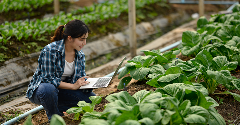News
EFSA publishes Food Enzyme Intake Model
10 Jul 2018EFSA has published the Food Enzyme Intake Model (FEIM), a tool for estimating chronic dietary exposure to food enzymes used in different food processes.

EFSA has published the Food Enzyme Intake Model (FEIM), a tool for estimating chronic dietary exposure to food enzymes used in different food processes.
FEIM follows the methodology recommended in 2016 by EFSA’s Panel on Food Contact Materials, Enzymes, Flavourings and Processing Aids (CEF). It has been developed on the basis of actual food consumption data collected by Member States and stored in the EFSA Comprehensive European Food Consumption Database.The user-friendly tool allows applicants, risk assessors and risk managers to estimate dietary exposure to food enzymes used in individual food manufacturing processes, such as baking or brewing. It can be accessed via the EFSA Knowledge Junction, and will be updated annually as more process-specific calculators are generated.EFSA has published its guidance on how to assess the safety of nanoscience and nanotechnology applications. The guidance gives practical suggestions on the types of testing that are needed and the methods that can be applied.Reinhilde Schoonjans, a risk assessment scientist at EFSA, said: “This guidance is very timely because it gives applicants the tools they need to prepare complete nanotechnology applications and equips risk assessors such as EFSA with the appropriate tools to evaluate their safety”.This document, which focuses on the safety assessment for human and animal health, underwent a three-month public consultation and takes into account all comments received.It covers areas such as novel foods, food contact materials, food and feed additives, and pesticides and is intended for all interested parties – in particular risk assessors, risk managers and applicants.The guidance will now enter a pilot phase, with finalisation envisaged by the end 2019.A second guidance will be developed in 2019 focusing on environmental risk assessment of nanoscience and nanotechnology applications in the food and feed chain.Related news

Digital platform can help optimise the protein quality of plant-based meals
29 Dec 2025
Researchers at Wageningen University have developed a metric to assess – and optimise – the protein quality of plant-based meals.
Read more
Debate over ban on ‘meaty’ names for plant-based products reaches stalemate
26 Dec 2025
The debate over a ban on plant-based products using “meaty” terms has reached a stalemate, leaving manufacturers in limbo and still facing overhauls to their marketing and packaging.
Read more
Our most-read articles of 2025
23 Dec 2025
From trade tariffs to heavy metals in protein, we look back at some of the industry’s highlights of 2025 and round up our most-read stories of the year.
Read more
Bigging up bean-based products and consumption in Britain
19 Dec 2025
Non-profit organisation the Food Foundation has launched a campaign, “Bang in Some Beans”, designed to increase UK consumers’ legume consumption.
Read more
Pioneers of circular plastic packaging push for new policies
18 Dec 2025
Some of the world’s largest food and drink companies have grown frustrated at investing in circular packaging systems, as the majority “wait on the sidelines”.
Read more
Which sustainability-related labels are consumers willing to pay a premium for?
10 Dec 2025
Products with animal welfare and geographic origin labels elicit a higher willingness to pay a premium than those with carbon-related labels, research suggests.
Read more
Sorghum emerges as better-for-you hero ingredient
9 Dec 2025
With the launch of Novak Djokovic’s sorghum-based brand, the grain’s popularity in the better-for-you snacking sphere is on the rise, thanks to its nutritional and sensory properties.
Read more
Innovation promise in 'maturing' plant-based dairy alternatives market
8 Dec 2025
Plant-based dairy is a maturing market that still faces significant hurdles around taste, functionality, nutrition, and price, but industry is innovating fast, according to experts speaking at Fi Europe.
Read more
Celebrating the winners of the Fi Europe Innovation Awards 2025
3 Dec 2025
Food industry stakeholders celebrated as the winners of the Fi Europe Innovation Awards were announced at a ceremony in Paris.
Read more
Yuka’s food scanning app helps consumers make healthier choices
2 Dec 2025
Global food scanning app Yuka helps consumers understand the content of their shopping baskets and shapes producers’ reformulation plans.
Read more